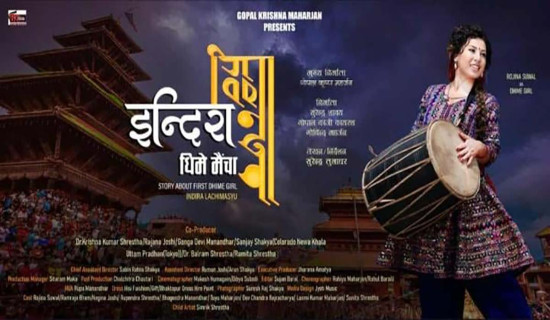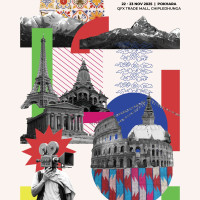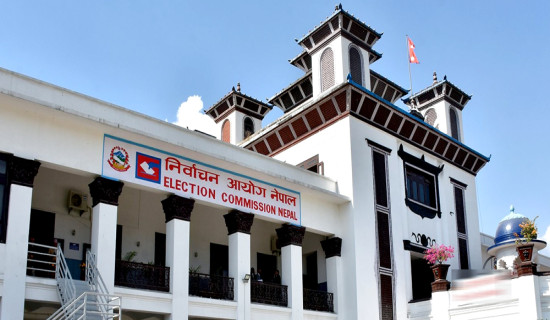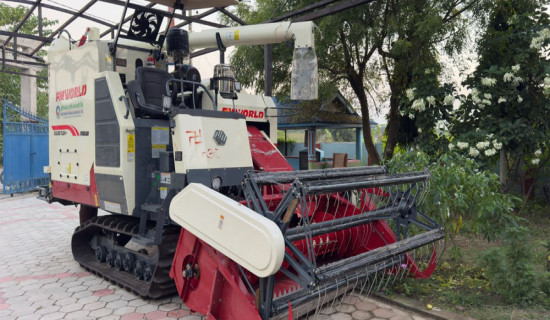- Sunday, 9 November 2025
Rochak Rachana: A Literary Tribute
Imagine the chaos at Tudikhel, where an unruly crowd struggles to focus on speakers from the dais. Now, contrast it with the turnout of literary giants at Nepal Academy Hall, Kamaladi, in a well-organised event. On Bhadra 3, 2081, the Academy hosted an audience of intellectuals, Gorkhapatra fellows, private papers, literary geniuses, and students. The audience seemed more excited than those on the dais, for they were there to honour an exclusive guest: Rochak Ghimire.
On this day, Nepal Shrasta Samaj organised a program to felicitate Rochak with a lifetime achievement award. Over one hundred sister agencies of literary worth had joined and funded the event, marking two auspicious reasons. First, it celebrated Rochak's six decades of the bimonthly magazine Rachana. Second, it honoured Rochak for reaching 84 years of life, a milestone celebrated in keeping with tradition. The event also featured a tall, imperial-sized text in a golden frame, set in his honour. Both reasons expressed sincere wishes for the continued health and longevity of the magazine and Rochak.
Literature and journalism
The Samaj also used this occasion to launch a souvenir, Rochak-Rachana, containing articles and memoirs from 149 writers in his tribute. The printed text of reception, 4x2 feet, appreciated Rochak and was read out to the audience, who responded with a standing ovation. Rochak has truly been a data bank in the world of Nepali literature and journalism, shaping narratives that inform and touch readers' hearts. As an invitee, I had the opportunity to briefly associate with the honoured guests, who were mostly senior and retired.
Devotion to this genre has been Rochak’s art of living since the early sixties, when King Mahendra seized power. He represents an era when Kathmandu had few literary magazine entrepreneurs. Challenges were abundant when article writers were few, publication funds were tight, and the readers' market was fragile. Scheduling a magazine or periodical was an arduous task. The market depended on the whim of readership, with publishers receiving few advertisers and sponsors. Only an editor with inner strength, unwavering dedication, and zeal could continue. This is evident from the number of magazines that started but collapsed. Many, like Sharada, Indreni, Pragati, Ruprekha (Kathmandu), Udaya (Banaras), and Bharati (Darjeeling), did not last. Conversely, Rachana has maintained its integrity, despite everyone knowing that money is more vital today than playing with letters, words, and sentences.
Influence and dedication
Rochak began his journalism career when society was rapidly changing, and the journalist’s role demanded extra energy. From the start, he stood by the magazine, displayed the ability to see beyond the headlines, and delved deeper into the human experience behind every story. His editorials and articles were not merely about publishing and distributing content to readers; they captured the essence of social conditions and uncovered the truth in life's complexities. As an editor, he nurtured countless young writers, encouraged them to write persistently, and many later became poets, dramatists, and fiction writers with their creative legacies.
Some examples include poets like Tulasi Diwas and Shailendra Sakar, who first published their poems in Rachana. Bhupi Sherchan’s celebrated poem ‘Hundaina Bihan Mirmire Tara Jharer Na Gaye, Bandaina Muluk Dui Char Saput Marer Na Gaye’ ("Morning does not dawn unless a few stars fall, and a nation does not thrive unless a few sons become martyrs") also first appeared in Rachana. Parijat, a Madan Puraskar awardee, was another fiction writer whose first story Rachana published.
In a true sense, Rochak's career began in the New Road or nearby coffee houses, where he met university professors, intellectuals, aspiring poets, and writers, along with avid readers. He discussed their works or upcoming poems, fiction, or drama and inspired them to continue their creative pursuits. At that time, the educated population in Nepal was around two thousand university graduates. This calculation is based on the first (Rastriya Panchayat) graduate constituency elections of 2024 BS, which had five thousand graduate voters in total.
Challenges and contributions
Rochak's father, Somnath Ghimire Vyas, was an established writer who penned many books in Sanskrit and Nepali. Naturally, he motivated his son by installing a Heidelberg printing machine from Kolkata at their Tangal residence under the name of Vyas Press. The father, a contemporary of Mahakavi Devkota and Kavi Shiromani Lekhnath, naturally guided his son toward a literary path.
The press and journalism faced dark days when Rochak began his journey. Publishers had to seek approval for individual article texts from the zonal commissioner. I remember an anecdote from the Mahendra era that illustrates this. A publisher, Pustak Sansar at Bhotahity, brought out a new volume titled Panchayat. It was marketed to cater to students' exam needs as Panchayat was a compulsory college syllabus. Initially priced at Rs. 30, the book's slow sales prompted the publisher to cut the price in half. Accordingly, he placed an ad in Gorkhapatra that read, "Panchayat ko mulya ma bhari kami" (roughly said: Panchayat slashes down from its heavy value!). The zonal commissioner took the ad as insulting the Panchayat system and calling for a public uprising, so he summoned him. The advertiser was rather amused to explain the jingle—it was just a textbook! The commissioner’s interrogation later turned into a good joke. Imagine the challenge when even installing a printing press required government approval.
But Rochak remained steadfast, becoming a voice for the voiceless. He established that journalism is not just a profession but a selfless mission—a responsibility to serve the literary good. It also reveals Rochak’s indifference to wealth pursuits. Instead, he has supported literary initiatives, mentored young writers and journalists, and become a friend and confidant to them all.
As the Pragya Hall celebrated him for literary glory, the event not only honoured Rachana but also wished for its ongoing impact. Even after 64 years, Rochak remains passionate, continuing to write, edit, and inspire. His legacy lives on not only in the words he has written but also in the lives he has touched, the careers he has shaped, and the truths he has championed. Rachana has made world glory among magazines.
















